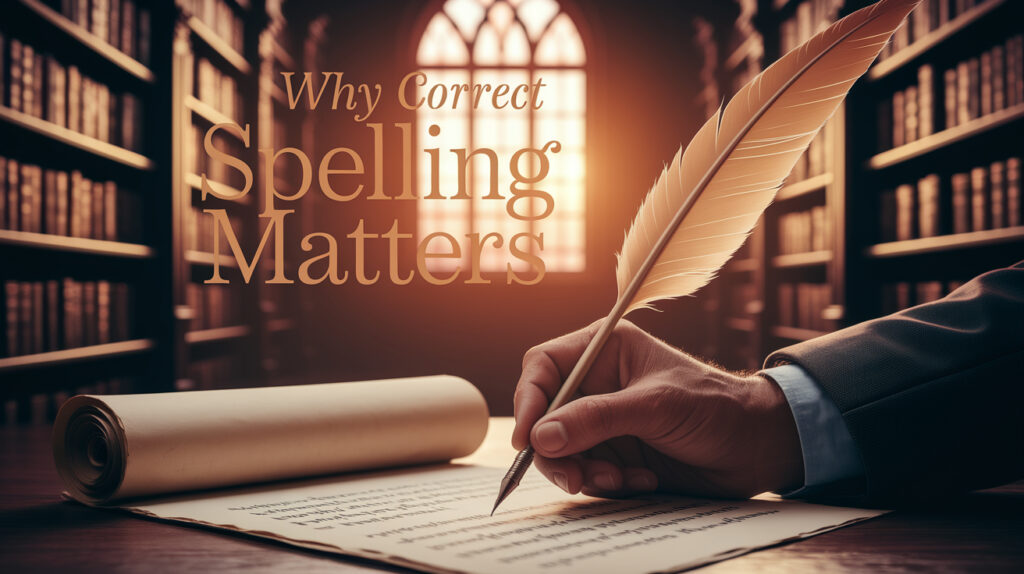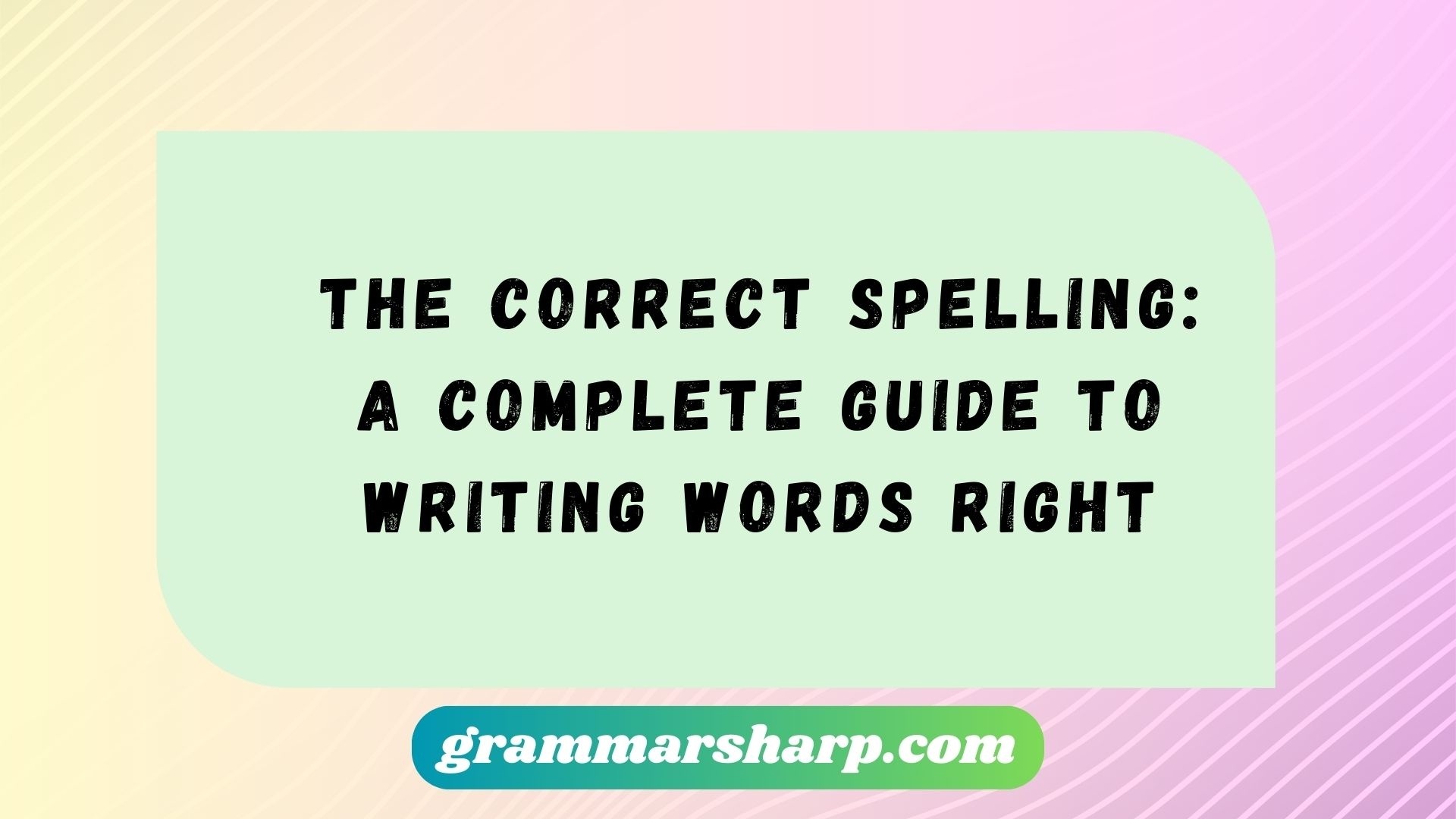Have you ever paused mid-sentence, second-guessing how to spell a simple word? You’re not alone. Spelling has been tripping people up for centuries, and in today’s fast-paced digital world, it’s even more important. The correct spelling of words is the backbone of clear communication. One misplaced letter can turn a serious business email into an embarrassing blunder or make a social media post go viral for all the wrong reasons.
Spelling goes beyond memorizing words—it’s about understanding patterns, language history, and even cultural differences. English is notorious for being tricky, thanks to its mix of influences from Latin, French, Germanic, and other languages. That’s why even native speakers often stumble when faced with certain words.
But here’s the good news: spelling is a skill you can improve with the right strategies. Whether you’re a student aiming for higher grades, a professional writing emails that leave a good impression, or simply someone who wants to avoid typos in texts, knowing the correct spelling will serve you well.
In this guide, you’ll discover why spelling matters, the most common spelling mistakes, differences between American and British English, key spelling rules, and proven methods to sharpen your spelling skills. We’ll also look at case studies where misspellings had surprising consequences.
By the end, you’ll see that spelling isn’t just about rules—it’s about confidence, credibility, and clarity.
What Does Correct Spelling Mean?
Correct spelling means writing words using the accepted arrangement of letters recognized by dictionaries and educational authorities. It ensures that readers understand your meaning without confusion.
Spelling hasn’t always been standardized. Before the 18th century, people spelled words however they sounded. For example, William Shakespeare spelled the same word several different ways in his plays. Standardized dictionaries, like Samuel Johnson’s A Dictionary of the English Language (1755) and Noah Webster’s American Dictionary of the English Language (1828), helped establish what we now call “correct spelling.”
Today, correct spelling varies slightly depending on region—American, British, Canadian, or Australian English. For example, “organize” is correct in the US, while “organise” is correct in the UK.
Why Correct Spelling Matters

Spelling isn’t just about nitpicking—it has real-world consequences. Here’s why spelling matters:
- Clarity and understanding – Misspelled words can change the meaning or confuse readers.
- Professionalism – Correct spelling builds credibility in business communication.
- Education and exams – Spelling mistakes lower grades in essays, tests, and reports.
- Search engines and SEO – Misspellings reduce online visibility since search engines prioritize correct spelling
- First impressions – A well-written resume or email makes you look detail-oriented.
📌 Example: Writing “manger” instead of “manager” in a job application could make the recruiter laugh—or toss your application aside.
Commonly Misspelled Words in English
English has thousands of confusing words, but some are misused more than others.
Here’s a table of some of the most commonly misspelled words:
| Misspelled Word | Correct Spelling | Why People Struggle |
| definately | definitely | Confusion with pronunciation |
| recieve | receive | Breaking the “i before e” rule |
| seperate | separate | Sounds like “seperate” |
| accomodate | accommodate | Double letters trip people up |
| embarass | embarrass | Two “r’s” and two “s’s” |
| wierd | weird | Exception to “i before e” |
| occurance | occurrence | Double “r” and double “c” issue |
| recomend | recommend | Forgetting the second “m” |
| governement | government | Silent “n” often skipped |
| beleive | believe | Rule confusion |
📌 Fun fact: “Embarrass” is so commonly misspelled that it even embarrasses dictionaries.
British vs. American Spelling Differences
One tricky part of spelling is that both British and American English have correct spellings, but they’re not always the same.
Here are some key differences:
| British English | American English | Example Sentence |
| colour | color | The sky is a beautiful colour/color. |
| organise | organize | We need to organise/organize the event. |
| cheque | check | She wrote a cheque/check for dinner. |
| defence | defense | The team’s defence/defense was strong. |
| theatre | theater | We’re going to the theatre/theater. |
| travelled | traveled | He travelled/traveled across Europe. |
👉 Neither version is wrong—it depends on your audience. Use British spelling for UK, Australia, and Canada, and American spelling for the US.
Rules of Correct Spelling in English

English spelling rules are full of quirks, but some guidelines help.
- “I before E except after C” – Example: believe, friend, receive. But beware: weird, neighbor, height.
- Double consonants when adding suffixes – Example: run → running, sit → sitting.
- Silent letters – Words like “knight,” “psychology,” and “island” hide letters you don’t pronounce.
- Drop the final ‘e’ when adding a vowel suffix – Hope → hoping, bake → baking.
💡 Mnemonic Trick: To spell “necessary,” remember “one collar and two socks” (1 “c” and 2 “s’s”).
Homophones and Easily Confused Words
Homophones are words that sound the same but have different meanings and spellings.
Here’s a quick cheat sheet:
| Word 1 | Word 2 | Word 3 | Usage Example |
| their | there | they’re | Their car is parked over there. They’re leaving soon. |
| affect | effect | — | The movie will affect you. The effect is powerful. |
| compliment | complement | — | She gave me a nice compliment. Wine can complement a meal. |
| your | you’re | — | Your phone is ringing. You’re going to love this. |
| its | it’s | — | The dog wagged its tail. It’s a happy dog. |
📌 Many spelling errors come from confusing these sound-alike words.
Tools and Resources for Checking Spelling
Technology helps, but it’s not perfect.
- Spell Checkers – Built into Word, Google Docs, and email apps.
- Grammarly – Great for spelling and grammar.
- Online dictionaries – Merriam-Webster, Oxford, Collins.
- Browser extensions – Ginger, LanguageTool.
⚠️ Caution: Don’t rely 100% on tools. Spellcheck won’t catch “form” vs. “from.”
Strategies to Improve Your Spelling Skills
You can train yourself to spell better with practice.
- Read daily – Exposure improves recognition.
- Keep a spelling journal – Write down tricky words.
- Play word games – Scrabble, Wordle, crossword puzzles.
- Use flashcards – Repetition builds memory.
- Break words into syllables – Example: en-vi-ron-ment.
📌 Example: A student improved grades by keeping a “word diary” and reviewing it weekly.
Common Myths About Spelling
- Myth: “Spelling doesn’t matter because of autocorrect.”
Truth: Autocorrect often creates new errors. - Myth: “English spelling has no rules.”
Truth: Rules exist, but exceptions keep it interesting. - Myth: “Only children need spelling lessons.”
Truth: Adults make spelling mistakes too—especially online.
Case Studies: Spelling Mistakes Gone Wrong
- NASA’s Mariner 1 Spacecraft (1962) – A single missing hyphen caused a rocket failure costing $18.5 million.
- Taylor & Sons Ltd. – A UK business went bankrupt after a government agency misspelled its name as “Taylor & Son Ltd.”
- Coca-Cola – In 2015, cans labeled “Hawii” instead of “Hawaii” sparked criticism.
📌 Lesson: One letter can make or break a brand—or even a space mission.
Correct Spelling in Professional and Academic Writing
Spelling impacts credibility everywhere:
- Resumes – A misspelled word can cost you the job.
- Emails – Typos can look careless.
- Reports – Academic grades drop for poor spelling.
💡 Quote: “Carelessness in spelling is carelessness in thought.” – Unknown
The Future of Spelling in the Digital Age
Texting and social media have influenced spelling habits. Abbreviations like “u” for “you” are common, but professional contexts still demand accuracy
- Autocorrect makes spelling easier but risks dependency.
- Voice-to-text creates errors if not checked.
- AI writing tools help but must be reviewed for accuracy.
📌 Prediction: Spelling will evolve, but clarity and professionalism will always require correct spelling.
Conclusion
Spelling may seem like a small detail, but it shapes communication, professionalism, and credibility. From school essays to business proposals, the correct spelling of words makes a difference in how others perceive you.
By understanding spelling rules, practicing consistently, and using the right tools, you can master even the trickiest words. Remember: one letter can change everything.
FAQs
What is the meaning of correct spelling?
Correct spelling means writing a word using the standard form accepted by dictionaries and grammar authorities.
Why is spelling important in communication?
It ensures clarity, prevents misunderstandings, and enhances professionalism.
Is British spelling correct or American spelling correct?
Both are correct, but which one you use depends on your audience and region.
What are the hardest English words to spell?
Some tough ones include “accommodate,” “embarrass,” “occurrence,” and “rhythm.”
How can I improve my spelling skills quickly?
Read more, keep a word journal, and practice tricky words regularly.

